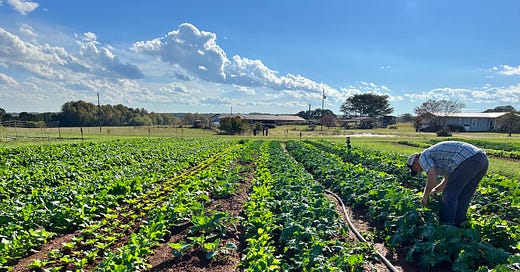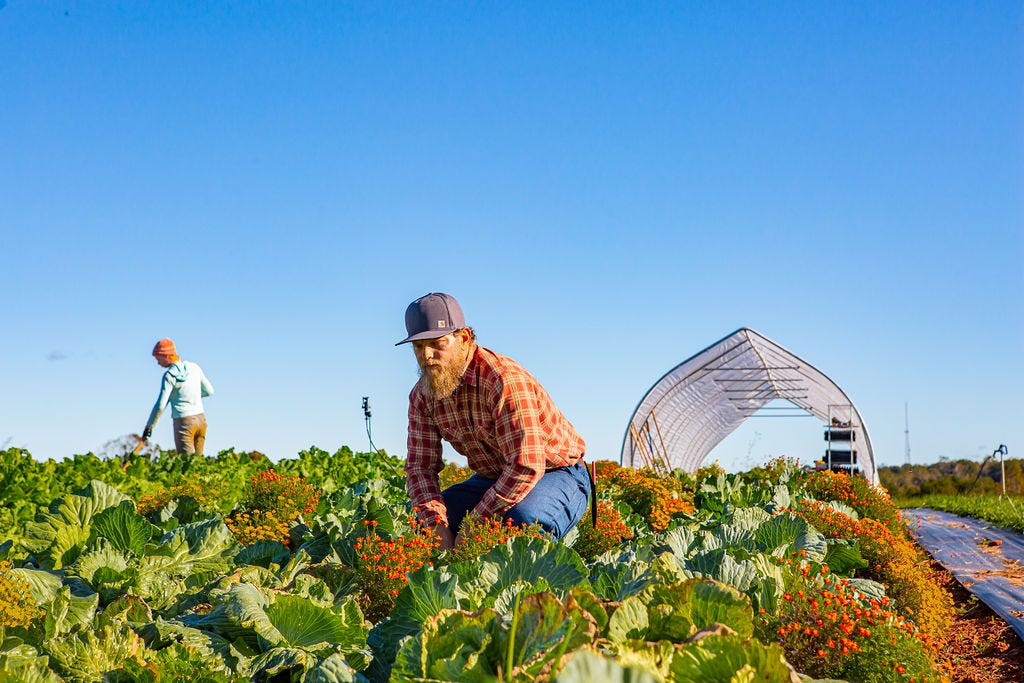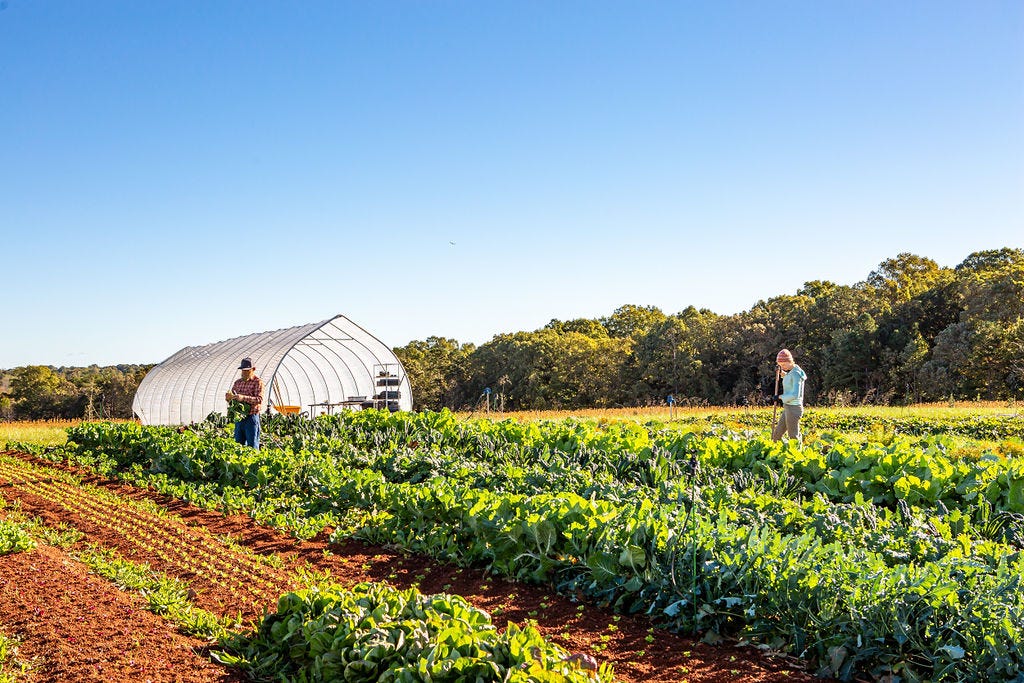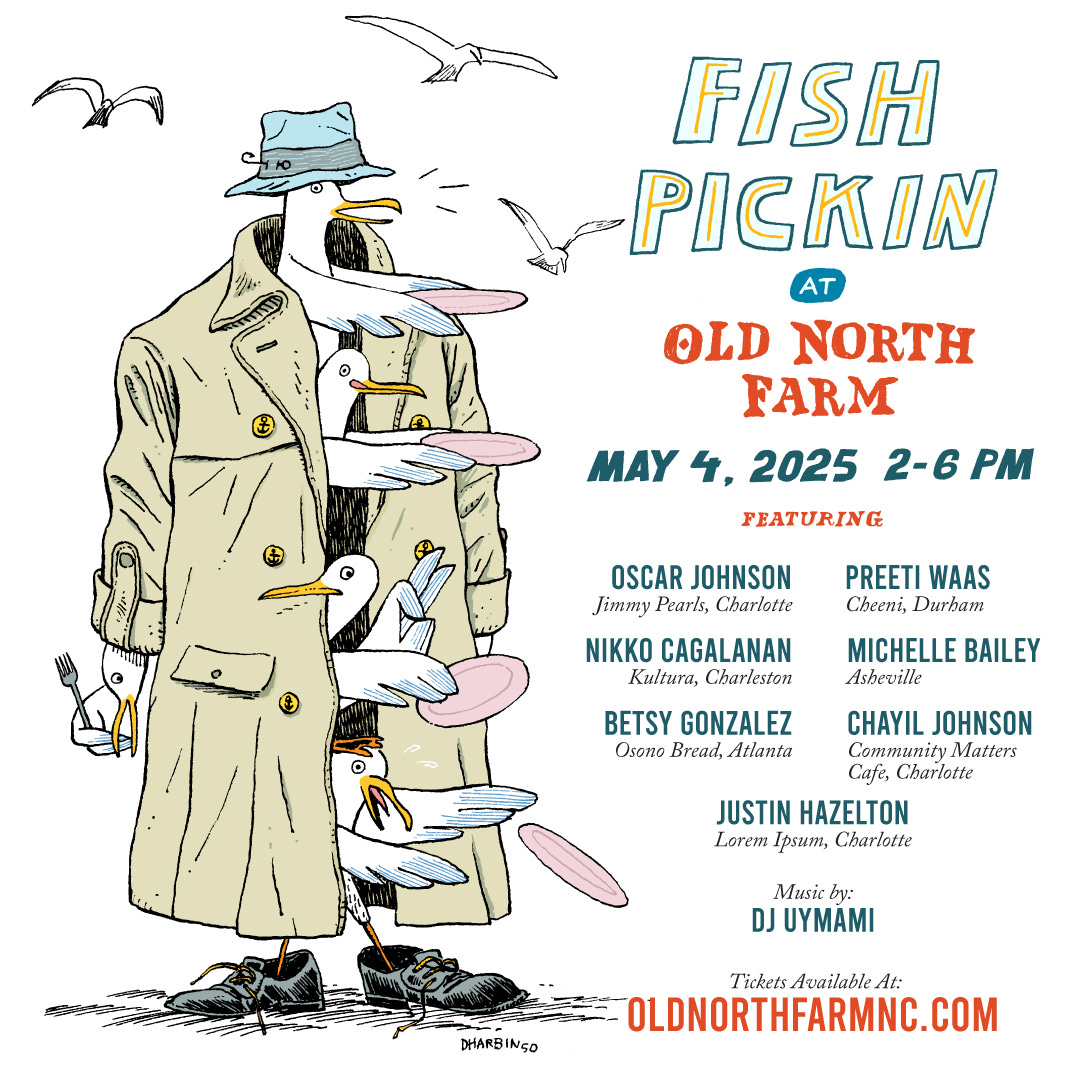I’m pacing the living room listening to a frustrated farmer on the other end of the phone line. The exasperated voice belongs to Kim Shaw of Small City Farm. I called her to talk about the recent federal funding freeze.
Like our farm, Shaw works with Freshlist, a local food hub based in Charlotte, to sell the vegetables she grows. Freshlist maintains established retail and wholesale channels, and until recently they bulk purchased goods from local farms thanks to the Local Food Purchase Assistance Program (LFPA) and the Local Food Purchase Assistance Program Plus (LFPA+). These programs, funded through contracts with the federal government, allowed Freshlist to make large(r) purchases from small farms and receive reimbursement. The money helped increase Freshlist’s spending with local food producers and increased their reach to places like Hearts & Hands Food Pantry and Refugee Support Services, along with other local drops including apartment complexes and neighborhoods in partnership with QC Family Tree and other programs. Essentially, Freshlist orchestrated the distribution of nourishing locally-sourced food for underserved, low-income and vulnerable populations in their radius of influence with the federal assistance provided through the LFPA and LFPA+.
Shaw said these particular purchases helped move large amounts of product, which makes a big difference for a small farm like hers. She added that it was an honor to provide high-quality produce to populations who often have difficulty accessing farm fresh items, usually folks who are limited by income, transportation, or some other class constraint.
“Why can’t people have this food?” Kim says. Her voice trembles and she begins to cry.
Freshlist sourced product from eight to fifteen local farms weekly for various produce boxes and partners. In total, they supported 63-65 small farms in the region, including ours. All with money received through the LFPA and the LFPA+.
News of the funding freeze landed in our inbox on January 28, 2025. The day before, the Office of Management and Budget (OMB) issued Memorandum MS-25-13 to community partners with the subject line: Temporary Pause of Agency Grant, Loan, and Other Financial Assistance Programs. The memorandum directed all federal agencies to “pause the obligation and disbursement of federal financial assistance until further review.”The next day, Freshlist sent a thoughtful email outlining the situation. Subject line: “Urgent Update: Suspension of Federally-Funded Purchasing Activities”.
In an instant, a bi-monthly income boost for our small farm was eliminated. This, just after the tumult of Hurricane Helene and the losses incurred from restaurant closures and crop loss, felt like insult to injury.
Soon after, I am on the phone with Erin Bradley, Director of Farmer Relations and Strategic Partnerships at Freshlist. She tells me Freshlist’s CEO Jesse Ledbetter was making calls to the USDA earlier that day to no avail. No one answered the phones and employees at the USDA were prohibited from sending emails. Bradley said career employees don’t know what’s going on: “They are not being communicated to, and cannot communicate down the line.” Bradley expressed frustration with what she calls a “cacophony of compounding issues.”
When I rang my local office, Bryon McMurry, Executive Director for the USDA Farm Service Agency in Cleveland County was breathless, exasperated, and close-lipped. “I’m supposed to send you to a website,” said McMurry, who had just received a cryptic email letting him know someone from Washington would be in his office on the following Monday with no further details. The chaos and frustration was palpable, though he was unable to speak freely.
As of this writing, the Trump administration terminated the LFPA and money provided by the LFPA+ ends on June 30, although Erin Bradley says “some of the food banks have already spent it all.” A new pot would’ve started on July 1 to keep money in those channels, but now it will not. Nationwide, the Trump administration canceled $1 billion in funding for local food purchases that support schools and food banks.
Cuts to other programs such as the National Resources Conservation Services (NRCS), originally established in 1935 after the havoc wreaked by the Dust Bowl, are affecting resources nationwide. Last year, OId North Farm was awarded a $20,000 grant through the Environmental Quality Incentives Program (EQIP) to make purchases and establish hedgerows to attract pollinators and beneficial insects. We received the first $4,000 payment of five yearly installments, but were notified that the grant is cancelled and we will no longer receive any more of the awarded money. The nature of grant awards requires the farmer to submit a proposal, then funding is awarded (or promised) but is only sent once the farmer provides proof of project completion or progress. These awards often require doing the work first and receiving funding later. Thus, this situation is even worse for others who spent their own money on farm projects with the promise of reimbursement only to have that promise broken. Signed contracts rescinded and void. Many are now stuck with debt.
The EQIP program helped mid-size commodity farms enact practices that were better for the environment. In those cases, the lack of funding means they’ll simply return to more harmful environmental practices. Any crop loss there will be subsidized by the USDA, like always, with tax dollars. Subsidies for small farms are much different. Instead of continuing the endless capitalistic cycle for the sake of global trade, a ceaseless machine pumping chemicals in to get crops out, small farm subsidies help maintain a fair price for the consumer and allows more people the opportunity to receive fresh food, as the partnerships with Freshlist did.
In his State of the Union, the President proclaimed his love for the farmer, as composite caricature, but only referenced those tied to global trade. While the small farmer, the ones who feed people in their communities, the ones whose livelihoods depend on every vegetable sold, the ones who exist on the thinnest of margins and don’t receive guaranteed government subsidies after a bad year, was not addressed at all. The programs that literally feed American people are being cut without regard to the effects on farmers, families, vulnerable populations, and school children.
States are suing the administration in a flurry of court cases. So far, rulings to reinstate funding have been summarily ignored by the administration. Again, legal contracts are flouted even when federal judges rule otherwise.
In late February, Jamie attended the Organic Seed Growers Conference in Corvallis, Oregon where people on the front lines of seed saving and seed breeding work gathered for a weekend of learning and networking.
In his weekly newsletter, Jamie wrote:
“As I'm drawn into conversations in the halls, on the bus, and at the table, the federal funding freeze is the hot topic. I'll say that the folks here, gathering at this conference are the biggest brains and hearts forging the most viable path to growing delicious organic produce for a future riddled with new plant stressors. These are the soldiers I want (and you do too) leading the way in research, development, and breeding new climate smart crops and ways to work through intellectual property rights, policy advocacy, and teaching the next generation of breeders and seed stewards. Everyone I talk with has been affected in some way.”
It’s difficult to square where any of the good work being done for the future of food, or caring for the land and people in sustainable and humane ways, or feeding current populations in need is deemed unnecessary, or radical, or inefficient as those in our highest offices claim. The facts just don’t support it. Our experience tells a different story as do the stories of thousands of others connected to their local food systems. When the small farmer loses, I am curious: Who wins?
TAKE ACTION: The Carolina Farm Stewardship Association has a call script along with links for contacting state legislators and federal representatives. Let your reps know that local food and farms matter. It’s a small action and takes little time. The more people who make the call, the more our legislators pay attention.
ON THE FARM: Spring is here again and we are getting ready for the first farmers market of the season this Saturday. There’s new energy on the farm, a new team of curious minds and helping hands, a hopeful energy after a really tough season. We welcomed young Lucy and Ben to the farm team earlier this month.
EVENTS: The Old North Farm Fish Pickin’, our biggest event of the spring season, is less than a month away. People come from all over for this fish fry on steroids. Get a load of this lineup! Tickets here.







This is so heartbreaking. Thank you for laying it out so clearly.
Thank you for sharing this, Keia, and for the reminder to support our local farms and farmers.